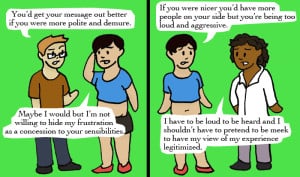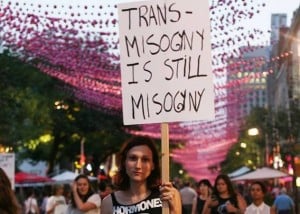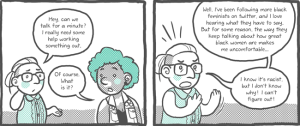
Students working together
The ideas around social capital and popularity often run alongside privilege and desirability politics.
Previously, I wasn’t aware of these terms. But after a few, let’s say, “discussions” with other organizers, I’m was made aware of the ways social capital can create hierarchies in organizing spaces.
These conversations led to a few things: Some folks felt that those with less social capital were simply jealous and others felt that folks with more social capital weren’t asking for notoriety and therefore should not be blamed for it.
In the end, these discussions weren’t effective. They went back and forth and, ultimately, only lead to a lot of hurt feelings.
I was drained by those conversations. I felt like nothing productive was accomplished and, often, they turned into a rat race of airing personal grievances.
Because, well, social capital is tricky.
Social capital is defined by the value of your social networks. It informs the opportunities and resources you have access to, including who you know and what opportunities you can access.
The more social capital you have the greater access you have to housing options, job opportunities, and public influence.
As a student and community organizer, my primary goal is to fight for the liberation of all Black people. The reality is that we live in a world plagued by racism, ableism, capitalism, cissexism, and heteronormativity — these circumstances create the society we all must navigate.
Ideals of beauty and acceptance encourage us to only listen to certain voices. Usually, the voices we choose belong to the able bodied, cis, light-skinned, class-privileged, and thin.
In most organizing spaces, it is rare for the voices of trans women, Black femmes, gender non-conforming folks, and those on the margins to be uplifted unless we are the ones leading the space.
In the past, I took a semester off of school and had to adjust my ideas about organizing outside of a college context. I found some amazing organizer friends who taught me a lot about scholarship and how to put folks and their identities at the forefront.
At my first meeting with my beloved MLM Study group, folks explained what a “progressive stack” was. My little cis queer self was very confused because, why can’t I talk first? But it also made me step back and acknowledge the privilege I have.
In our meetings, progressive stack looked like this: folks who wanted to speak were put on a list and those with less privilege or more intersecting identities were offered the chance to speak first.
Outside of privilege, I realized when I was in organizing meetings that I was normally looking for opportunities to use the most progressive and radical “organizer” lingo or question someone’s strategy and be the smartest one in the room.
Encountering the idea of progressive stack helped me step back, shut the hell up, and listen to others.
Black liberation can be overshadowed by our refusal to address our privilege. Sometimes, we need to just shut up and listen.
Our social capital should always be used to uplift folks not because we feel guilty, but because the work of liberation and genuine love for our fellow comrades involves reworking societal norms.
So how do you change the dynamics of your organization? How do you make folks step up or step back in a way that helps catalyze the work but also allow others the space to grow? It’s difficult but below are a few tips on how to start redistributing social capital.
Step back, listen, and uplift
One of the biggest pieces of understanding social capital is that you may, at times, be unaware that you have it. Being unaware of your social capital may result in hierarchies in organizations that you may not notice.
The goal is to always step back and listen to folks who may be dealing with the harsh end of these hierarchies and uplift those in ways that are progressive to the work being done.
If you see yourself becoming the focus of a movement and you know folks who haven’t been given an opportunity to do an interview, facilitate a workshop, or organize a community meeting maybe it’s time to step back and allow others to be placed into that role.
Prioritize Black, trans, disabled people in housing and job opportunities
When opportunities for jobs, housing or speaking engagements come around try to involve and provide those opportunities to folks who may not be automatically considered first for them.
So, this means if there are opportunities for folks to speak on a panel or to apply for jobs that advocate for their voice, let folks who wouldn’t normally be considered be a part of the conversation — with their consent, of course.
Accessibility is key
I absolutely hate when folks use academic language EVERY DAY.
As a Black woman from a low-income household, I try my best to make sure my work is accessible to anyone in my family. This includes making sure my language is clear, widely available online, and is easily accessed by differently abled folks.
My very best illustration of this is: imagine a hotep.
A hotep who can use all of the academic language and theory to create an analysis on Black liberation and yet no hears them because they aren’t truly connecting to the folks they work with.
It seems simple, but if you are truly working for the masses you have to understand when academia is needed and when it’s not.
Redefine what desirability politics look in your activism and your personal life
Be aware of the folks you regularly plug into and see if those are people who already have the same privileges as you.
I realized after getting dragged by my friend that my desirability politics were all decided for me and that I simply was attracted to men that played into safe gender norms.
A part of my own personal journey was questioning my own desirability politics and questioning why I liked certain traits in partners and how that was hindering me from doing effective work around gender justice.
Most people gravitate to folks with similar personal stories, but it’s vital to make changes in your personal life that will eventually change in your work and activism.
Use progressive stack if it works well for your space
Progressive stack is used in many organizing spaces to allow those with the least amount of privilege the space to speak first.
The stack begins with folks raising a hand to speak and the person facilitating will choose folks with less privilege.
For example, in past groups, when we would discuss capitalism or elitism, Black women and femmes were able to voice their opinions without being cut off or interrupted.
I quickly learned that I didn’t need to respond to every question, but also it made me feel safe to be a loud Black woman for once because I knew my voice was being heard.
This can be a process to check and work through but it has the potential to create a new standard of uplifting the voices of more marginalized folks in ways that may not manifest outside of organizing spaces.
Get feedback from other organizers about best practices
In order to get the best understanding of your strategies around building stronger and more effective communities, you must ask and be willing to get feedback on what folks need.
I think the hardest part about coalition building can be dealing with the messiness of working with others around issues that so directly affect our lives.The best practices of folks with said privileges are to work through difficult conversations.
***
For a lot of organizing spaces, social capital can become a point of contention. I know for myself, I felt that if I didn’t have enough Twitter followers or wasn’t as well known, then, clearly, I wasn’t that good of organizer.
In reality, my path or goals may just be different.
Don’t get me wrong, social capital can be a great way to leverage exposure to help others and bring in new, vital voices that may have been missing in the movement.
I know as someone who has had to grapple with jealousy and mistrust, as long as there is honesty and clarity in how everyone operates, social capital can be used for good.
[do_widget id=’text-101′]
Clarissa Brooks is an Everyday Feminism Reporting Fellow. Clarissa is senior at Spelman College, a journalist, and a community organizer. Originally from Charlotte, NC, Clarissa works to blend her love of community, ethical journalism and scholarship in a way that will create a better world. Clarissa has been an ONA HBCU Fellow, Equality For Her Intern and Summer Fellow for Students For Education Reform.Clarissa has been engaged in community organizing work and journalism for nearly 3 years. From mobilizing communities, hosting teach-ins, leading direct actions, and developing policy her love of community always comes first.
Search our 3000+ articles!
Read our articles about:
Our online racial justice training
Used by hundreds of universities, non-profits, and businesses.
Click to learn more




















